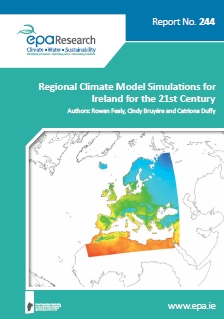Authors: Rowan Fealy, Cindy Bruyére and Catriona Duffy
Summary: The model simulations represent Ireland’s contribution to the European component of the Coordinated Regional Downscaling Experiment (EURO-CORDEX), a World Climate Research Programme (WCRP) initiative to address climate information needs at the regional level.

The EU recognises the need for a two-tiered approach to improving resilience to climate change, requiring both mitigation and adaptation strategies to be put in place; in the absence of binding, global, agreements on emissions targets, adaptation strategies are increasing in priority. Due to the range of different climate impacts likely to be experienced across the European Union, tailored adaptation strategies are required at a country or regional level. The development of National Adaptation Strategies, required under Article 4 of the UNFCCC, reflect the need for a coordinated approach to policy formulation at EU level. An essential element of developing National Adaptation Strategies is the requirement for climate information of the past, present and possible future evolution of the climate system. The current research generated climate scenarios for two plausible future climates, described by the representative concentration pathways (RCPs), namely RCP2.6 and RCP8.5. These RCPs were selected to represent a future in which either significant adaptation (RCP8.5) or more manageable adaptation (RCP2.6) may be required to manage and reduce the potential impacts of future changes in the climate system.
Climate is one of many drivers that can influence exposure and consequently risk; thus, climate change needs to be considered in the wider context of these factors. The fact that uncertainty about future changes in the climate system will continue to remain, even with perfect knowledge of the system, also needs to be recognised and incorporated into our approach for developing robust adaptation to climate change.
Climate model outputs provide a basis to assess the robustness of a range of policy options which seek to reduce our exposure to existing and past changes in climate. This represents a “policy first” rather than a “science first” approach; such an approach begins with identifying a suite of possible adaptation options that are socially, economically and technically feasible, which can then be evaluated for robustness based on different narratives, including future changes in the climate system. An assessment of the degree to which we are resilient to both past and present changes in the climate system is essential if we are to formulate effective policies which seek to increase our resilience to potential future changes in climate.
The current research utilised a start of the art regional climate model to dynamically downscale climate simulations from EC-Earth, an earth systems model, developed by a consortium of European research institutes and national meteorological agencies, including the national meteorological service Met Éireann and the Irish Centre for High-End Computing (ICHEC). The model simulations represent Ireland’s contribution to the European component of the Coordinated Regional Downscaling Experiment (EURO-CORDEX), a World Climate Research Programme (WCRP) initiative to address climate information needs at the European, national and regional level.
https://www.epa.ie/media/epa-2020/publications/research/Research_444_thumbnail[1].jpg